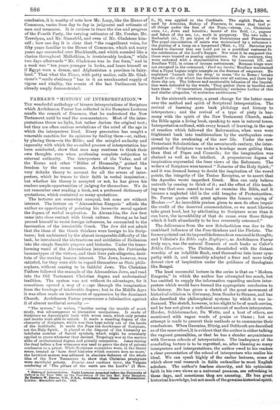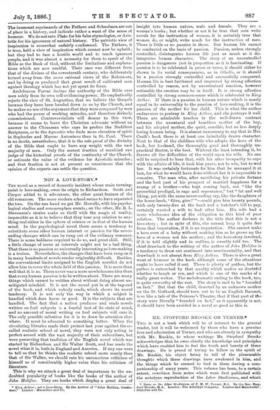FARRAR'S "HISTORY OF INTERPRETATION."' THE wonderful anthology of bizarre interpretations
of Scripture which Archdeacon Farrar has collected in his Bampton Lectures recalls the remark of Erasmus, that he understood the New Testament until he read the commentators. Most of the inter- pretations throw no light, but rather darken the original text ; but they are often curious revelations of the mind of the age in which the interpreters lived. Every generation has sought a venerable sanction for its opinions by finding them—or, rather, by placing them—in the Bible ; and the mingled audacity and ingenuity with which the so-called process of interpretation has been conducted, show that men may continue to think their own thoughts even when professing complete subjection to external authority. The interpreters of the Vedas, and of the Koran and other "Bibles of Humanity," gained like freedom by the same means. Archdeacon Farrar has a very definite theory to account for all the errors of inter- preters, which he traces to their faith in verbal inspiration ; but whether his theory is accepted or not, he has given his readers ample opportunities of judging for themselves. We do not remember ever reading a book, not a professed dictionary of quotations, which contained so many quotations.
The lectures are somewhat unequal, but none are without interest. The lecture on "Alexandrian Exegesis" affords the author an opportunity of pointing his favourite moral against the dogma of verbal inspiration. In Alexandria, the Jew first came into close contact with Greek culture. Strong as he had proved himself to resist foreign influences, he succumbed to the fascination of the irresistible Greek. The Jew did not admit that the ideas of the Greek thinkers were foreign to his Scrip- tures; but undeterred by the almost insuperable difficulty of the task, he introduced the abstractions and subtleties of Hellenism into the simple Semitic prayers and histories. Under the trans- forming wand of the Alexandrian interpreters, the Patriarchs became types of the virtues, and their lives pale allegories, desti- tute of the moving human interest. The Jews, however, were satisfied, for they were able to regard themselves as Stoic philo- sophers, without ceasing to be faithful Jews. The Christian Fathers followed the example of the Alexandrian Jews, and read into the Old Testament Christian dogma and ecclesiastical tradition. The system was not without its advantages, for it sometimes opened a way of ezcape through the imagination from the bondage of intolerable dogma ; but in the Middle Ages it was often made an instrument of oppression by the dominant Church. Archdeacon Farrar pronounces a fulmination against it of almost mediaeval severity :-
"The system," he writes, "besides saving the trouble of much study, was advantageous to hierarchic usurpations. It made of Scripture an Apocalyptic book with seven seals, which only priests and monks were able to unlock. It made a standing dogma of the obscurity of Scripture, which was thus kept safely out of the hands of the multitude. It made the Pope the doorkeeper of Scripture, not the Holy Spirit. It placed at the disposal of the hierarchy an indefinite number of flaccid symbols, which might be oracularly applied to prove whatever they desired. Tropology was at the service alike of ecclesiastical dogma and priestly usurpation. Jesus raising the dead before a few witnesses was used to prove the duty of private confession to a priest. While Scripture narratives were, in the literal sense, treated as ' bare dead histories which concern men no more,' the Levitical system was adduced in absolute defiance of the whole idea of the New Testament to show that Christian presbyters were sacrificial priests. Domini mint cardines terra, the Vulgate rendering of The pillars of the earth are the Lord's' (1 Sam.
• Maori( of Interpretation. Bight Lectures preached before the University of Oxford in the Year 1881. on the Foundation of the late Rev. John Bampton. By Frederic W. Farrar, O.D., P.5.8., Archdeacon and Oanon of Westminster. London: Macmillan and Co. 1886. ii., 8), was applied to the Cardinals. The eighth Psalm vf,
used by Antonins, Bishop of Florence, to mean that God pi all things under the feet of the Pope,—sheep, i.e., Christi=
oxen, i.e., Jews and heretics ; beasts of the field, i.e., pagans
and fishes of the sea, i.e., souls in purgatory. The two rods c Zechariah (xi., 7) are types of the Dominicans and Franciscan' The papal canonisation of saints was maintained. by a reference t the putting of a lamp on a lampstand (Matt. v., 15). Baronius pre tended to discover that our Lord pat on a pontifical vestment fo: the celebration of the Lord's Supper. Nor must it be supposed that these were treated as passing applications. On the contrary, they were endowed with a demonstrative force by Innocent III. and Boniface VIII. in crises of intense seriousness. Because kings were not excepted in the command, ' Feed my lambs,' Boniface maintained that a Papal Legate might trample on the decrees of emperors. He explained 'Launch into the deep,' to mean ' Go to Rome ; betake thyself to the city which has dominion over all nations, and there lay down thy net. The hideous andi unutterable infamies of the Inquisi- tion were defended by the words, ' They gather them in, bundles and burn them.' 0 temerariam impudentiam,' exclaims Luther of this and similar allegories, ' et scelestam ambitionem.' "
In the sixteenth century, a great change for the better came over the method and spirit of Scriptural interpretation. The revival of learning gave back philology and history to interpreters ; and the revival of a type of piety in har- mony with the spirit of the New Testament Church, made the Bible again a living book, speaking to men in natural tones. Interpretation suffered, with every branch of learning, in the age of reaction which followed the Reformation, when men were frightened back into traditionalism by the earthquakes occa- sioned by the awakening of the new life. Under the new Protestant Scholasticism of the seventeenth century, the inter- pretation of Scripture was under a bondage more galling than, than that of Popes and Councils ; for the imagination was- chained as well as the intellect. A preposterous dogma of inspiration superseded the freer views of the Reformers. The writers of Scripture were termed " Notaries of the Holy Spirit ;" and it was deemed heresy to doubt the inspiration of the vowel• points, the integrity of the Textile Receptus, or to assert that the Apostles wrote imperfect Greek. Men can only believe untruth by ceasing to think of it ; and the effect of this teach- ing was that men ceased to read or examine the Bible, and it became a neglected idol in the cold temples of Protestantism. Dr. Farrar quotes with great aptness the famous saying of Hooker :—" As incredible praises given to men do often impair the credit of the deserved commendation, so we must likewise take great heed, lest by attributing to Scripture more than it can have, the incredibility of that do cause even those things which it hath abundantly to be less reverently esteemed."
The deliverance from the new Scholasticism was due to the combined influence of the Free-thinkers and the Pietists. The former pointed out its impossible demands on reasonable thought; and Voltaire's La Bible enfin Expliquee, as Archdeacon Farrar truly says, was the natural Nemesis of such books as Calov's Biblia Illustrala. The Pietists, dissatisfied with the distant worship of an infallible Book, read themselves into inner sym- pathy with it, and insensibly adopted a freer and more truly devout view of inspiration under the guidance of theologians like Bengel.
The least successful lecture in the series is that on "Modern Exegesis," in which the author has attempted too much, but has omitted to supply the information regarding modern inter- preters which would have formed the appropriate conclusion to his history. He has given a sketch of the great movement of historical criticism in Germany, from Semler to Strauss, and has also described the philosophical systems by which it was in- fluenced. The sketch, however, is too slight to be of much service, and he has not given a sufficient account of modern interpreters. Herder, Schleiermacher, De Wette, and a host of others, are mentioned with vague words of praise or blame ; but no attempt is made to present their methods or to summarise their conclusions. When Gesenius, Hitzig, and Delitzsoh are described as of the sameschool, it is evident that the author is either talking the vaguest generalities, or that he has a slender acquaintance with German schools of interpretation. The inadequacy of the concluding lecture is to be regretted, as, after blaming so many interpreters and interpretations, the author owed to his readers a clear presentation of the school of interpreters who realise his ideal. We can speak highly of the earlier lectures, some of which show real research in fields unfamiliar to most English scholars. The author's fearless sincerity, and his optimistic faith in his own views as a universal panacea, are refreshing in these days, and sometimes they are amusing. He has great historical knowledge, but not much of the genuinehistorical spirit. The incessant reprimands of the Fathers and Schoolmen are out of place in a history, and indicate rather a want of the sense of humour. We do not rate Plato for his false etymologies, or Aris- totle for his ignorance of natural history. The patristic view of inspiration is somewhat unfairly condemned. The Fathers, it is true, held a view of inspiration which cannot now be upheld ; but they bad to face a hostile world and to teach ignorant people, and it was almost a necessity for them to speak of the Bible as the Book of God, without the limitations and explana- tions which are now needful. Their case was different from that of the divines of the seventeenth century, who deliberately turned away from the more rational views of the Reformers, and by doing so produced that great revolt of cultivated men against theology which has not yet spent its force.
Archdeacon Farrar derives the authority of the Bible over men solely from its own self-evidencing power. He emphatically rejects the view of St. Augustine, that we believe the Gospels because they have been handed down to us by the Church, and he makes no use of the argument that they were composed by men who had the power of working miracles, and therefore divinely commissioned. Controversialists will demur to this view, because it seems to leave the Christian advocate 'without an answer to the Chinaman who says he prefers the Buddhist Scriptures, or to the Agnostic who finds more elevation of spirit in Sophocles and Marcus Antoninus than in St. Paul. There is no doubt, nevertheless, that it is the sole proof of the divinity of the Bible that ought to have any weight with the vast majority of men. Only the merest fraction of mankind can judge of the historical proofs of the continuity of the Church, or estimate the value of the evidence for Apostolic miracles ; and that fraction is not at present so unanimous that the opinion of the experts can settle the question.



































 Previous page
Previous page